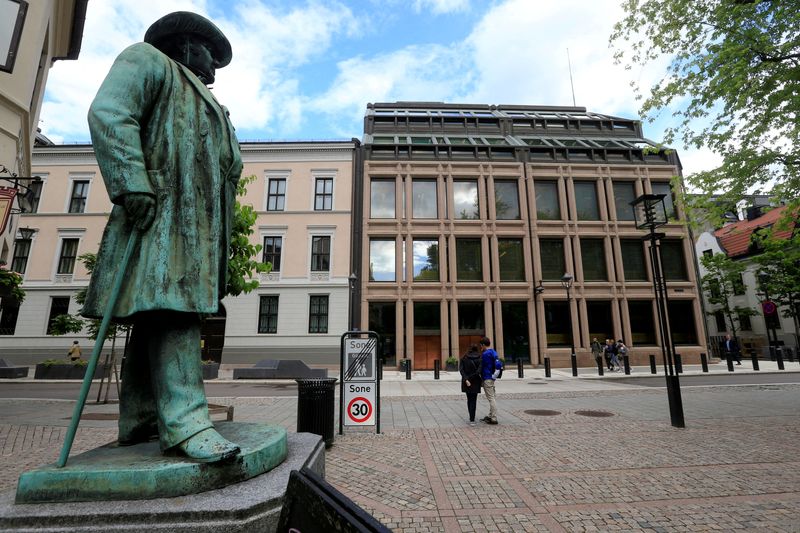By Terje Solsvik and Victoria Klesty
OSLO (Reuters) - Norway's central bank raised its benchmark interest rate on Thursday as widely expected, and said more hikes were likely next year although that would depend on the impact of a surge in coronavirus infections and the emergence of the Omicron variant.
Norges Bank's monetary policy committee raised the sight deposit rate to 0.50% from 0.25%, its second hike in three months, as predicted economists polled by Reuters and in line with the central bank's own plan.
"There is considerable uncertainty about the evolution of the pandemic and its effects on the economy. But if economic developments evolve broadly in line with the projections, the policy rate will most likely be raised in March," Norges Bank Governor Oeystein Olsen said in a statement.
Norway's currency, the crown, firmed to 10.13 against the euro at 0944 GMT from 10.20 just before Norges Bank's announcement.
The bank said it had discussed the risks posed by the potential economic impact of the pandemic.
Should more restrictions be needed and lead to reduced economic activity through spring next year, "further rate hikes may be postponed," it said.
Norway's economy has rebounded this year and Norges Bank in September became one of the first central banks to hike rates since the start of the pandemic.
But the government on Monday again tightened restrictions to curb the spread of Omicron, announcing a partial lockdown that included a ban on serving alcohol in bars and restaurants for the next four weeks.
The bank said it was also concerned by a potentially higher-than-projected rise in domestic wages and prices caused by capacity constraints and persistent global price pressures.
"If there are prospects of persistently high inflation, the policy rate may be raised more quickly," it said.
Norway cut rates three times in 2020 to combat the impact of the COVID-19 pandemic, contributing to a boom in housing prices as borrowers took advantage of cheap credit.
The monetary policy committee continued to signal three hikes for next year, with the key rate thus expected to rise to 1.25%.
"The message from Norges Bank is that the Norwegian economy is in less need of emergency rates," DNB Markets Chief Economist Kjersti Haugland said.

Having contracted by 3.0% in 2020, the Norwegian mainland economy is now expected to grow by 4.1% in 2021, more than the 3.9% predicted three months ago, and will likely see a 3.5% expansion next year, weaker than the previous forecast of 4.5%.
The U.S. Federal Reserve said on Wednesday it would end its pandemic-era bond purchases in March and pave the way for three rate hikes by the end of 2022 as the economy nears full employment and inflation continues to surge.